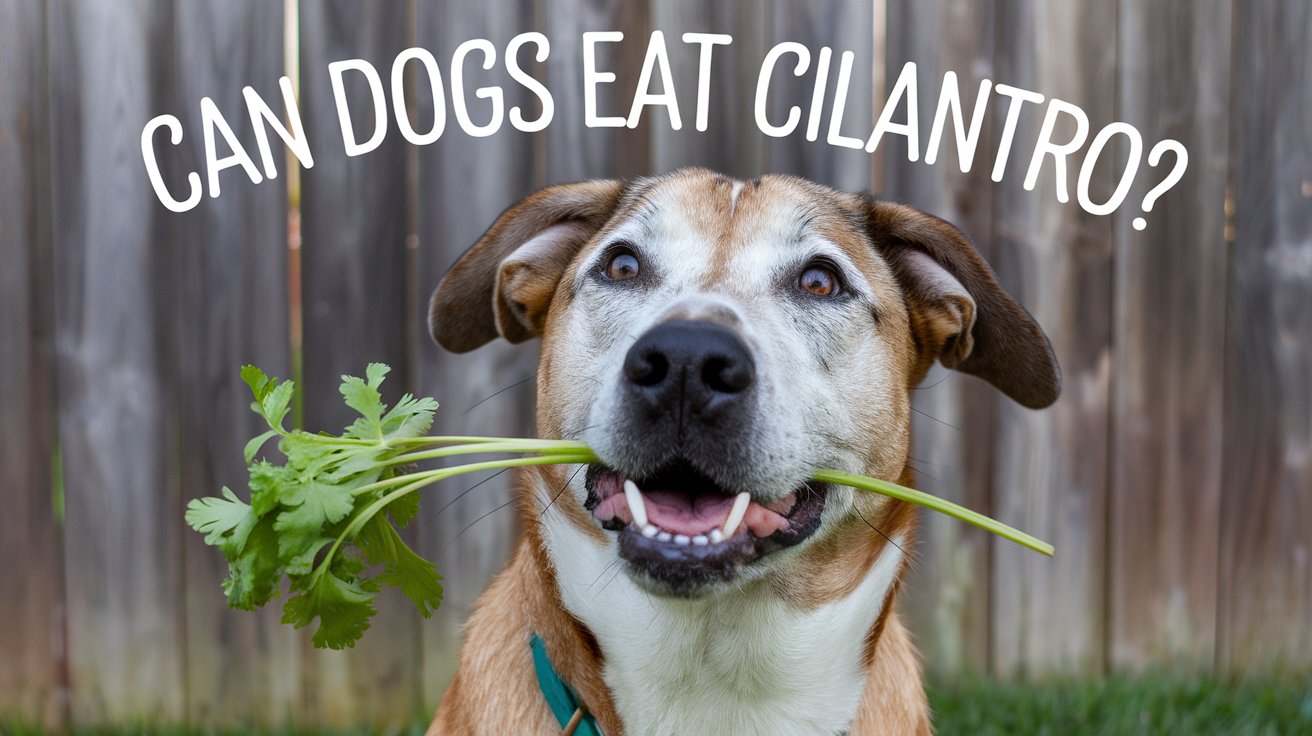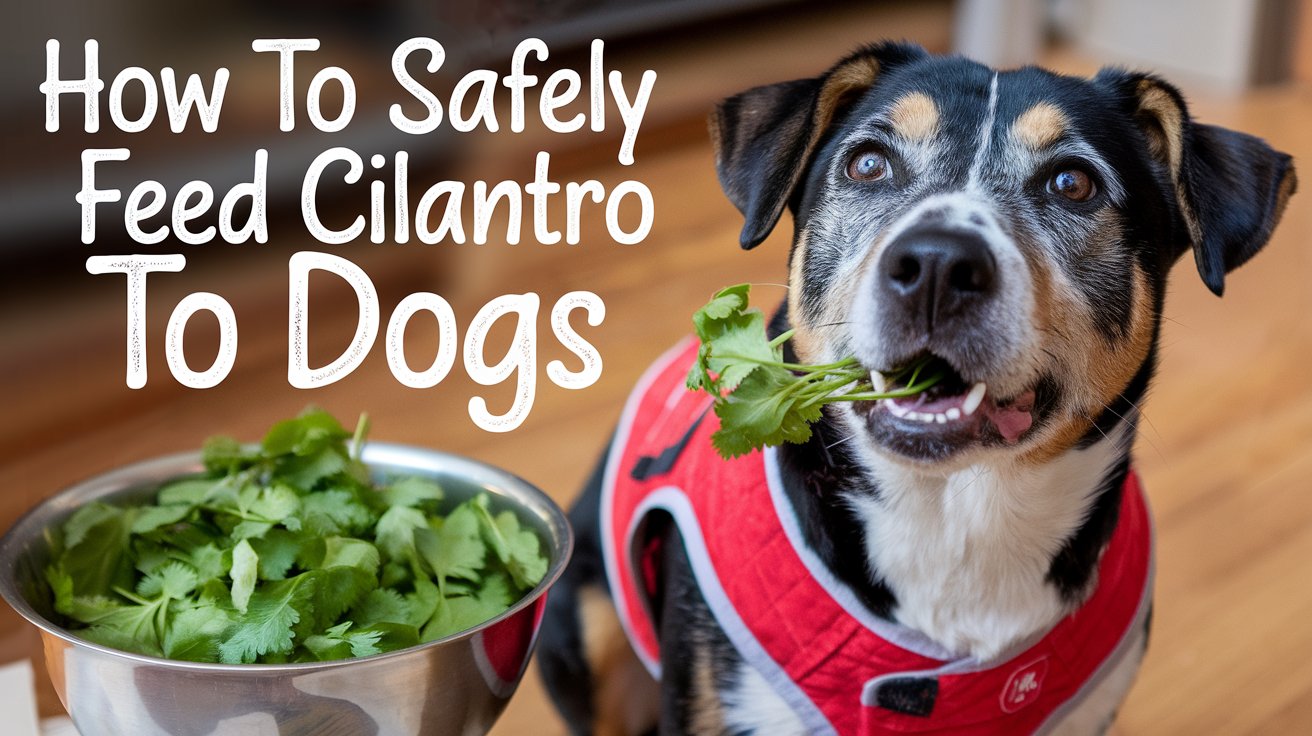
Can Dogs Eat Cilantro? 5 Surprising Health Benefits
Dogs have curious palates and often want to taste what we’re eating, including herbs like cilantro. But as pet owners, we always want to be sure what’s safe before sharing a snack with our furry friends. So, can dogs eat cilantro? The answer is yes! Cilantro, also known as coriander, is generally safe for dogs in moderation. Not only can it enhance the flavor of your dog’s meal, but it also offers a variety of health benefits. However, like any new food, it’s essential to understand both the advantages and the potential risks before making it a regular part of your dog’s diet.
What is Cilantro?
Cilantro is a leafy green herb commonly used in various cuisines around the world. With its unique citrusy and slightly peppery flavor, cilantro can be found in many dishes from Mexican salsa to Thai salads. Known for its rich nutritional profile, cilantro contains vitamins, minerals, and antioxidants that contribute to its reputation as a superfood for humans. But can those same benefits extend to our four-legged friends?
The Nutritional Breakdown of Cilantro
Cilantro is low in calories, making it a light and nutritious addition to your dog’s meals. It’s packed with:
- Vitamins A, C, and K – Essential for boosting the immune system, promoting healthy skin and eyes, and supporting bone health.
- Minerals like potassium and magnesium – These minerals support heart health and help maintain proper muscle function in dogs.
- Antioxidants – Powerful compounds that can help reduce inflammation and protect against cell damage.
These nutrients make cilantro an excellent way to supplement your dog’s diet, but there are additional health benefits to consider as well.
Health Benefits of Cilantro for Dogs
1. Improved Digestion
Cilantro contains natural oils that aid in digestion by soothing the stomach and promoting the production of digestive enzymes. If your dog suffers from mild gastrointestinal issues, such as gas or bloating, a small amount of cilantro could help alleviate discomfort. This is particularly useful for dogs who experience occasional indigestion after meals.
2. Detoxifying Properties
Cilantro is known for its ability to bind to heavy metals and other toxins in the body, helping to remove them through the natural detoxification process. This can be beneficial for dogs, especially those exposed to environmental pollutants or toxins. Including cilantro in their diet may support their liver function and overall health.
3. Antibacterial and Antifungal Benefits
The antimicrobial properties of cilantro are effective against certain harmful bacteria and fungi. If your dog is prone to infections or has a compromised immune system, cilantro might offer some natural protection. Additionally, cilantro can help keep your dog’s breath fresh by neutralizing odor-causing bacteria in the mouth.
4. Anti-inflammatory Effects
Dogs suffering from joint pain or inflammation, especially senior dogs, could benefit from the anti-inflammatory compounds in cilantro. These properties can help ease discomfort and improve mobility, particularly in dogs with conditions like arthritis. While cilantro isn’t a substitute for veterinary care, it can complement other treatments by offering gentle relief.
5. Boosted Immune System
Thanks to its high levels of vitamins and antioxidants, cilantro can help strengthen your dog’s immune system. Regular consumption of cilantro may provide extra support during flu season or help combat minor illnesses by improving your dog’s natural defenses.

How to Safely Feed Cilantro to Dogs
While cilantro is safe for dogs, it’s important to introduce it slowly to avoid any adverse reactions. Follow these guidelines to ensure your dog can safely enjoy cilantro:
Start Small
Begin by offering a tiny pinch of cilantro mixed into your dog’s regular food. Monitor their reaction for any signs of allergies or digestive upset, such as vomiting or diarrhea.
Use Fresh Cilantro
Fresh cilantro is the best option for your dog. Dried cilantro loses some of its nutritional value, and some dogs may not enjoy its stronger flavor. Always wash the cilantro thoroughly to remove any pesticides or chemicals.
Avoid Seasonings
When giving cilantro to your dog, ensure that it’s plain and free of any seasonings or sauces. Many human recipes that include cilantro also contain ingredients like onions, garlic, or salt, which are toxic to dogs.
Mix with Other Dog-Friendly Foods
You can mix cilantro with other dog-friendly foods like carrots, chicken, or rice to create a tasty and healthy meal. Not only will your dog enjoy the added flavor, but the meal will also provide a balanced mix of nutrients.
Potential Risks of Cilantro for Dogs
Although cilantro is safe for most dogs, there are a few things to be cautious about:
Allergic Reactions
Some dogs may be allergic to cilantro, though this is rare. Signs of an allergic reaction may include itching, swelling, trouble breathing, or the appearance of hives. If you notice any of these symptoms after feeding your dog cilantro, stop immediately and contact your vet.
Digestive Upset
Introducing any new food too quickly can lead to digestive problems like diarrhea or vomiting. Always start with small amounts of cilantro and gradually increase it over time to allow your dog’s digestive system to adjust.
Interactions with Medication
If your dog is on any medication, particularly for liver or kidney conditions, consult your veterinarian before adding cilantro to their diet. Certain compounds in cilantro could interfere with medications or exacerbate pre-existing conditions.
Can Puppies Eat Cilantro?
Yes, puppies can eat cilantro, but with extra caution. Since their digestive systems are still developing, it’s crucial to introduce any new food, including cilantro, in very small quantities. As with adult dogs, observe for any signs of digestive upset or allergic reactions. It’s also a good idea to consult with your vet before offering cilantro to puppies, especially if they are still on a specialized diet for growth and development.
How Much Cilantro Can I Give My Dog?
The appropriate amount of cilantro depends on your dog’s size and tolerance. A small pinch for smaller dogs and up to a tablespoon for larger breeds is generally safe. As a rule of thumb, cilantro should make up only a tiny fraction of your dog’s diet, used as a garnish or supplement rather than a main ingredient.
Can Dogs Eat Cilantro Every Day?
While cilantro is safe in moderation, it’s not necessary to feed it to your dog every day. Offering cilantro a few times a week as part of a balanced diet is enough to reap its benefits without overwhelming your dog’s system. As always, variety is key to a healthy diet, so be sure to rotate cilantro with other dog-friendly herbs and vegetables.
Other Herbs Safe for Dogs
In addition to cilantro, several other herbs are safe and beneficial for dogs, including:
- Parsley – Helps freshen breath and supports kidney function.
- Basil – Contains anti-inflammatory properties and can help reduce stress in dogs.
- Thyme – Rich in antioxidants and beneficial for respiratory health.
Herbs to Avoid
Not all herbs are safe for dogs. Be cautious and avoid these toxic herbs:
- Garlic – Can cause anemia and digestive issues.
- Onions – Toxic to dogs, leading to red blood cell damage.
- Chives – Related to garlic and onions, also harmful to dogs.

FAQs
Can dogs eat cilantro in salsa?
No, most salsas contain ingredients like onions, garlic, or spices that are toxic to dogs.
Is cilantro good for dogs with bad breath?
Yes, cilantro has antibacterial properties that can help freshen your dog’s breath.
Can cilantro help with my dog’s digestion?
Yes, cilantro can aid in digestion and may reduce gas and bloating.
Is dried cilantro as beneficial as fresh cilantro for dogs?
Fresh cilantro is more nutritious and palatable for dogs, while dried cilantro may lose some of its potency.
What should I do if my dog has an allergic reaction to cilantro?
Stop feeding cilantro immediately and contact your vet if you notice symptoms like itching or swelling.
Can senior dogs eat cilantro?
Yes, cilantro’s anti-inflammatory properties can benefit senior dogs, especially those with joint issues.
Conclusion
In summary, can dogs eat cilantro? Yes, they can! Cilantro offers a range of health benefits, from improved digestion to enhanced immune function. However, moderation is key, and it’s essential to introduce it slowly into your dog’s diet. Always consult your vet before making significant changes to your pet’s nutrition, particularly if they have underlying health conditions. When used properly, cilantro can be a flavorful and healthy addition to your dog’s meals, providing them with extra vitamins, antioxidants, and other nutrients that contribute to a long and happy life.

I’m Haseem Ali, a passionate writer focused on dog diet, health, training, lifestyle, and care. I’m dedicated to sharing expert advice and practical tips to help fellow dog owners provide the best for their furry friends. When I’m not writing, I enjoy spending time with my own dogs and exploring new pet-friendly activities.
